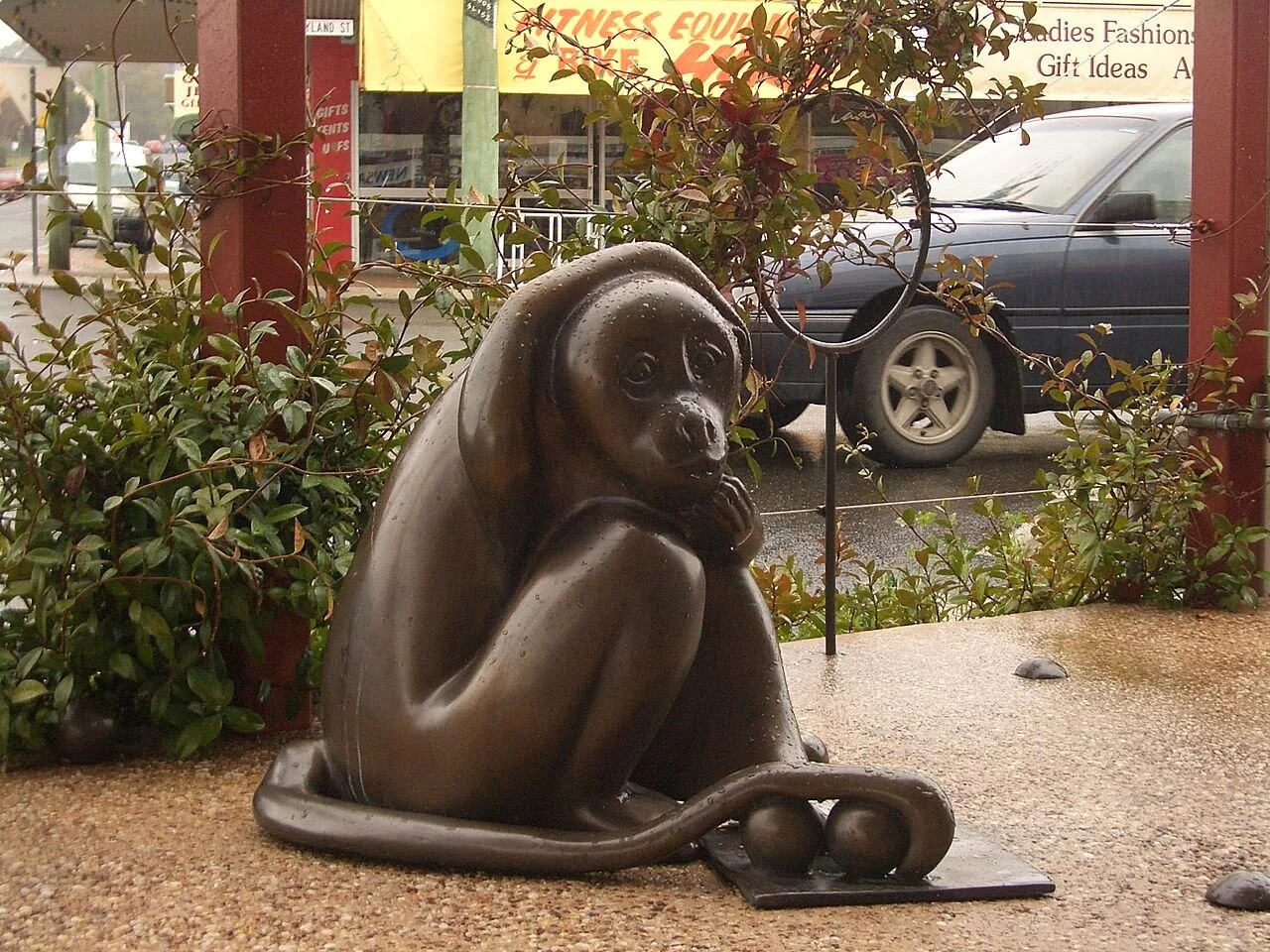6 July 2020
Cold enough to freeze the balls off a brass monkey is slang phrase that is quite literal, even though it describes an impossibility. It refers to the testicles on a brass figure of a monkey, exaggerating the severity of the temperature. But one often hears a nautical explanation for the term that bowdlerizes it and renders it “safe” for use around innocents and the easily offended.
The key to understanding the phrase is that it, like many slang phrases, existed in multiple variants in its early years, before settling into the canonical form we’re familiar with today. For instance, there is this 1835 reference from Frederic Chamier’s The Unfortunate Man to a monkey in cold weather, but with no reference to brass or to parts of the anatomy:
He was told to be silent, in a tone of voice which set me shaking like a monkey in frosty weather.
Three years later, we have this appearing in the New York Herald on 30 May 1838. It is the canonical form we know today, except it’s a reference to the monkey’s nose:
Old Knites was as cool as a cucumber, and would have been so independent of the weather, which was cold enough to freeze the nose off of a brass monkey.
And there is this sermon that was reprinted in the Plattsburgh Republican on 4 June 1842 that varies it more, including a reference to the brass monkey’s nose. I include the rather long quote mainly because this may be the only description of love in the English language that makes an allusion to sheep ticks:
When you love, you go it like water down an eave’s spout—you cling to the idols of your hearts like sheep-ticks to the wool—now the waves of joyful excitement beat about in your breasts, and now the mild moonlight of melancholy rests upon a scene of gloom and silence—now you feel a curious, silly, sublime, mysterious and magnetic sensation all over, even to your very ancles [sic], as though you were just beginning to feather out—and now again your hearts, hands, feet and flesh are as cold and senseless as the toes of a brass monkey in winter.
In these early uses, it’s not just monkeys that lose their body parts; one use of the phrase from Britain in 1859 refers to the tail of a tin opossum.
Nor is it always the cold temperature that is important in early uses of the phrase. Herman Melville’s 1847 Omoo has:
Falling to with our hoes again, we worked singly, or together, as occasion required, until “Nooning Time” came.
The period, so called by the planters, embraced about three hours in the middle of the day; during which it was so excessively hot, in this still, brooding valley, shut out from the Trades, and only open toward the leeward side of the island, that labor in the sun was out of the question. To use a hyperbolical phrase of Shorty’s, “It was ‘ot enough to melt the nose h’off a brass monkey.”
Other references to the brass monkey’s anatomy include tails, hairs, and guts. Because, as a general rule, references to genitalia in print were avoided until the latter half of the twentieth century, we don’t have a record of balls as part of the phrase in print until Eric Partridge’s 1937 Dictionary of Slang and Unconventional English. Some of these references to other anatomical parts are undoubtedly bowdlerized versions that avoid referring to testicles in print. The key point is that balls, brass, and even monkey are not essential elements of early uses of the phrase. What is important is the phrase’s hyperbolic nature and impossibility.
We also see use of brass monkey as an adjective referring to inclement weather from at least 1890, attesting that the use of the full phrase, in all of its variants, was so common that it didn’t need to be used in full.
The oft-repeated, but false, nautical origin would have the monkey be a brass rack used to store cannonballs on board ship. According to the tale, in cold weather the rack would shrink, spilling the balls onto the deck. As we have seen, the lexical evidence doesn’t support this. The early uses of the phrase are not especially in nautical contexts, and they also refer to heat and other body parts. Furthermore, there is no record of monkey being used to mean a rack holding cannonballs (or anything similar)—although there are some seventeenth century uses of monkey to mean a type of brass cannon and monkey tail is a 19th century name for a handspike used to aim and level cannon.
And the nautical origin story ignores some basic facts of physics and naval life. First, while brass, like any metal, does contract in cold weather, the amount of such shrinkage would be so infinitesimal that it would not cause the spilling of a rack’s contents. Also, naval ships did not store cannonballs in vertical racks; the rolling of the ship made this impractical. Instead, they were stored in holes drilled in horizontal wooden planks known as shot garlands.
Sources:
Chamier, Frederic. The Unfortunate Man, vol. 1. New York: Harper and Brothers, 1835, 55. HathiTrust Digital Archive.
Dow, Jr. “Short Patent Sermon.” Plattsburgh Republican (New York), 4 June 1842, 1. NewsBank Readex: America’s Historical Newspapers.
Green’s Dictionary of Slang, 2020, s.v. cold enough to freeze the balls off a brass monkey phr., brass monkey, adj.
Melville, Herman. Omoo. New York: Harper and Brothers, 1847, 258.
Oxford English Dictionary, second edition, 1989, s.v. brass, n. (entry partially revised post-1997), shot-garland, n.
———, third edition, September 2002, s.v. monkey, n., monkey tail, n.
“Stray Leaves from a Straggler’s Note Book.” New York Herald, 30 May 1838, 2. Gale Primary Sources: Nineteenth Century U.S. Newspapers.
Photo credit: Vmenkov, 2008, Wikimedia Commons, used under Creative Commons CC BY-SA 3.0 license.

